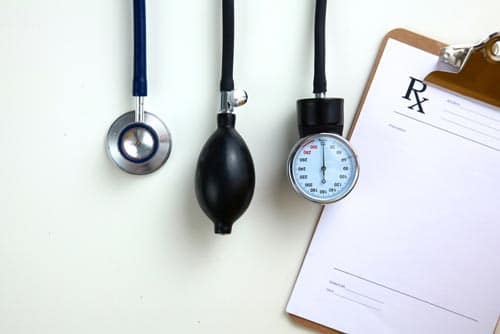You’ve probably read about the new blood pressure recommendations that are making big headlines.
It used to be that doctors were advised to treat you when you tested higher than 140/90. Now it’s 130/80.1
This is great news for Big Pharma. It means that nearly half of Americans are now classified as having high blood pressure. The figure for people over 65 is 80%.
The market for hypertension drugs is expected to skyrocket.
But to understand why you should be skeptical about the new guidelines, you must first understand the study on which they are based.
It’s called SPRINT, short for Systolic Blood Pressure Intervention Trial. Researchers divided more than 9,300 men and women ages 50 and older into two groups. One was assigned to lower their systolic pressure to less than 120. The other was assigned to less than 140. Systolic is the upper number in blood pressure readings.2
The goal was to see if achieving a level under 120 would be beneficial.
It turned out that subjects under 120 had a 33% reduced risk of heart attack, heart failure, and stroke. And they had 25% lower risk of death compared to those who were under 140.
Drug companies and their mainstream medicine allies fastened on these numbers to tell us we all need to be under 120. But they didn’t talk about the fine print of the study…
The High Price of Low Blood Pressure
If you go through the data, you see that getting under 120 comes at a high price.3
To reach such a low level, subjects had to take an average of three different hypertension drugs. And the subjects in the under 120 group had nearly twice as many serious medication-related side effects as the 140 group.
Plus, the study subjects were far from a random sample of the population… They were all high-risk patients.
To enroll in the study, you had to have kidney disease, heart disease, or be at high risk for heart disease.
In other words, these were not average healthy adults.
Dr. Aaron Carroll is appalled at how the study is being used to push people onto blood pressure drugs. He is an associate dean at the Indiana University School of Medicine.
“Almost none of the newly labeled hypertensive people (those with systolic blood pressure between 130 and 140) should be placed on medications,” he says. “These people should be advised to eat right, exercise, drink responsibly, and not smoke.”4
Dr. Carroll points out that the Sprint study did not look at people with mild high blood pressure who do not have heart problems. So the results do not apply to them.
He objects to overhyped articles about the study that needlessly frighten patients and convince their doctors to prescribe unnecessary medications.
“A lot of the coverage made it sound as if something drastic had happened overnight,” he says. “Nothing had. We just changed the definition of hypertension.”
The #1 Fix for High Blood Pressure
People with high blood pressure are often told to cut salt. Smoking, bad diet, lack of exercise, and drinking too much can also lead to hypertension.
But a recent study found one factor was more powerful than all of those combined.
It’s body weight.
Researchers at the University of Alabama at Birmingham found that people who eat right, don’t smoke, exercise, and drink moderately—or not at all—reduce their risk of high blood pressure by 27%.
But subjects who keep a steady, healthy body weight lower their risk by 41%.5
What’s a healthy body weight? Rely on waist size instead of a scale to find out. The formula is simple: Your waist should be half your height or less.
For example, a 6-foot (72 inches tall) man should have a waist size of 36 inches or less. A 5-foot-4 (64 inches tall) woman’s waist should not exceed 32 inches.
Another proven strategy to reduce high blood pressure without drugs is to eat foods rich in potassium.
Multiple studies show the mineral allows your body to excrete sodium, which causes your blood pressure to drop. It is similar to putting yourself on a low-sodium diet.6
Here are eight foods among the highest in potassium:7
- Avocado, 1 whole: 1,068 mg
- Wild-caught salmon, 6 ounces: 1,068 mg
- Sweet potato, 1 medium: 952 mg
- Acorn squash, 1 cup: 896 mg
- Spinach, 1 cup: 839 mg
- Dried apricots, ½ cup: 756 mg
- Coconut water, 1 cup: 600 mg
- Kefir and yogurt (Make sure you get brands with no sugar added), 1 cup: 579 mg
You may be wondering why bananas are not on the list. They are perhaps the food best known to be high in potassium. But one banana contains less of the mineral than the foods listed above. It has just 422 mg of potassium.
Potassium supplements are another option. But most experts say they should be taken only under a doctor’s supervision. Too much potassium can cause a dangerous condition called hyperkalemia. It can lead to abnormal heart rhythms.8
Editor’s Note: Something strange was happening to pilots training to fly F-16 fighter jets. The ones who went into the program with elevated blood pressure were coming out a few weeks later with normal, healthy readings.
They hadn’t taken any medications… Their diets hadn’t changed… And they hadn’t made any changes to their exercise regimens.
Go HERE to discover their secret—and how you could lower your blood pressure up to 15 points using the same trick.
Like this Article? Forward this article here or Share on Facebook.
References:
1 http://www.acc.org/latest-in-cardiology/ten-points-to-remember/2017/11/09/11/41/2017-guideline-for-high-blood-pressure-in-adults
2 https://www.nytimes.com/2017/11/13/health/blood-pressure-treatment-guidelines.html?hp&action=click&pgtype=Homepage&clickSource=story-heading&module=first-column-region®ion=top-news&WT.nav=top-news
3 http://www.nejm.org/doi/full/10.1056/NEJMoa1511939#t=article
4 https://www.nytimes.com/2017/11/13/health/blood-pressure-treatment-guidelines.html?hp&action=click&pgtype=Homepage&clickSource=story-heading&module=first-column-region®ion=top-news&WT.nav=top-news
5 https://www.institutefornaturalhealing.com/2017/10/1-natural-fix-for-lower-blood-pressure/
6 https://www.institutefornaturalhealing.com/2017/04/heres-better-way-to-lower-blood-pressure/
7 http://www.health.com/health/gallery/0,,20721159,00.html#sweet-potatoes-0
8 http://www.health.harvard.edu/staying-healthy/should-i-take-a-potassium-supplement

